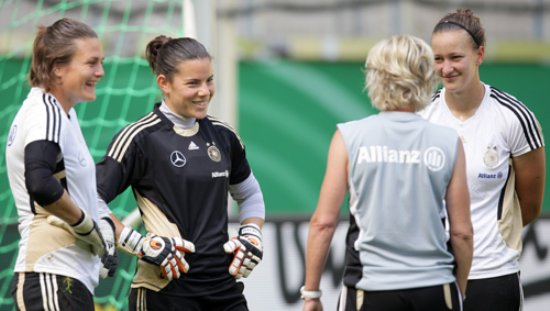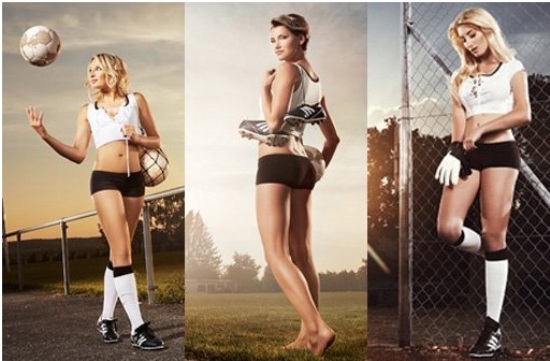17/01/2014 | Writer: Nora Leggemann
When Angerer told the public about her bisexuality, she was surprised how little the media and everybody else reacted.

For the first time, a prominent professional football player in Germany, Thomas Hitzlsperger, has made his homosexuality public two weeks ago. Since then, the subject of football, homosexuality and homophobia is being discussed very controversially in the German media. Many people see Hitzlsperger’s coming-out as an important step to fight homophobia in football and in the world of sports in general. Nevertheless, Hitzlsperger made his homosexuality public AFTER the end of his career. It still seems pretty much unthinkable to be openly gay and to be a successful football star at the same time, although the German Football Association has declared to fight homophobia in football, and although there are many LGB (lesbian, gay, bisexual) fan clubs all over Germany.
...and what about the women?
While everybody talks about homophobia in (German) football (and actually means men’s football), it seems worthwhile to take a look at the German women’s football. Only a few days ago, the openly bisexual goal keeper and team captain of the German women’s national football team, Nadine Angerer, was elected the FIFA World Woman Player 2013. And the second goal keeper of the Team, Ursula Holl, is openly homosexual and has ’married’ (registered life-partnership) her partner. And she is not the only one in the world of women’s football. For women, it therefore does not seem to be a contradiction to be openly bisexual/gay and at the same time to be a successful football player. Does that mean that women’s football is less homophobic than men’s football? And if so, why?
Women’s football in Germany
While men’s football – the results of all games as well as news about the private lives of the football players – is pretty much everywhere every day, women’s football is only slowly getting more popular. While the male football players – especially those, who play in the national team – are stars, only few people actually know the names of the women playing for Germany. Football is still widely seen as a men’s sport – the fact that also women play football is very hard to swallow for many people and therefore widely ignored. But the fact that the women’s football national team of Germany is actually highly professional and successful and wins one important match after the other makes it hard to keep ignoring it and so, the general and medial interest in women’s football has increased in the past years.
Lesbian and bisexual women in (German) football
When Angerer told the public about her bisexuality, she was surprised how little the media and everybody else reacted. It did not seem to be a big deal at all. So why is everybody now making such a fuss about Hitzlsperger’s coming-out? The German sociologist Nina Degele explains the different reactions as follows: Football is still seen as male and heterosexual. Therefore, the breaking of a taboo for homosexual men lies in their ’different’ sexuality. For female football players, the breaking of a taboo is already the fact that they are women AND playing football. Therefore, their homo- or bisexuality is only the cherry on the cake. As a matter of fact, female football players are generally suspected to be lesbian. It is an old and ongoing prejudice that a woman who plays football must be lesbian.

Studies assume that 30 to 40 percent of the women in competitive sports are lesbian. But nevertheless, public outings of female football players are not as common as they could be. The bi- and homosexuality of female football players is often more a (open) secret. It is being said that there was always kind of an unwritten law in the DFB (German Football Association) that female homosexuality was being accepted as long as the persons concerned did not make it public. But all in all, it cannot be denied that today there are more openly gay and bisexual female football players than there are among the male.
So is women’s football more open and less homophobic?
All this encourages the assumption that the diversity of sexuality and desire is handled with more openness in women’s football than it is in men’s football. But the image campaigns of the past five years, which are supposed to make women’s football more popular, make it hard to think of women’s football as a realm of openness and progress. Still, female AND partially lesbian seems to be too much breaking of taboos for many people. And since nobody can do anything about the fact that in the women’s football team all players are female, it is the image of being gay that is being tackled. The fear of many people is that the lesbian image could frighten young players and their families off, besides it is being assumed that women’s football has to become more heterosexual in order to make the public more aware of it and to get more popular. The sports reporter Florian Wichert names the new trend very clearly: „I think the women have understood that, in order to make their sport big, they have to show more than what they can do on the football field“. In this sense, one of the most popular questions during the world championship 2011 was if the players of the Women’s national team put on make-up before football games. In a beauty campaign, pictures of the perfectly styled players were taken in order to show the world how beautiful and feminine the German national team is. And some football players from the German Bundesliga have been photographed and published in the Playboy magazine. The overall message: Look, we are sexy and available for men.

The future of German women’s football...
If this kind of image campaigns is the only way to make women’s football more attractive for the public, it does not seem very desirable to make women’s football more popular. The image campaigns are clearly sexist, heteronormative and they suggest homophobia. Is that the direction women’s competitive sports are going? Is that the price for becoming more accepted and regarded? In my opinion, it does not have to be like that. Instead of trying to fit into the male dominated, heteronormative system, women’s football and the inherent breaking of a taboo could also be used to actually fight sexism and homophobia and to implement real equality between men and women, heterosexuals and LGB people.
Tags: life

